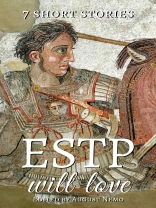ESTP are freedom lovers, like to be among people and are always ready to get down to business. In this book you will find seven short stories specially selected to please the tastes of the ESTP. These are stories by renowned authors that will surely bring reflections, insights and fun to people with this kind of personality.
This book contains:
– The Man Without a Temperament by Katherine Mansfield.
– The Lottery Ticket by Anton Chekhov.
– Meditations: Book Five by Marcus Aurelius.
– The Heroic Slave by Frederick Douglass.
– The Green Door by O. Henry.
– Hands by Sherwood Anderson.
– The Birthday of the Infanta by Oscar Wilde.For more books that will suit you, be sure to check out our Two Classic Novels your Myers-Briggs Type Will Love collection!
***
Cover image: Alexander the Great (356BC-323BC), ESTP, undefeated in battle and one of history’s most successful military commanders.
Despre autor
Kathleen Mansfield Murry was a prominent New Zealand modernist short story writer and poet who was born and brought up in colonial New Zealand and wrote under the pen name of Katherine Mansfield. At the age of 19, she left New Zealand and settled in England, where she became a friend of writers such as D. H. Lawrence and Virginia Woolf. Mansfield was diagnosed with extrapulmonary tuberculosis in 1917; the disease claimed her life at the age of 34.
Anton Pavlovich Chekhov was a Russian playwright and short-story writer, who is considered to be among the greatest writers of short fiction in history. His career as a playwright produced four classics, and his best short stories are held in high esteem by writers and critics. Along with Henrik Ibsen and August Strindberg, Chekhov is often referred to as one of the three seminal figures in the birth of early modernism in the theatre. Chekhov practiced as a medical doctor throughout most of his literary career: ‘Medicine is my lawful wife’, he once said, ‘and literature is my mistress.’
Marcus Aurelius was Roman emperor from 161 to 180 and a Stoic philosopher. He was the last of the rulers traditionally known as the Five Good Emperors, and the last emperor of the Pax Romana, an age of relative peace and stability for the Roman Empire. He served as Roman consul in 140, 145, and 161. The Column and Equestrian Statue of Marcus Aurelius still stand in Rome, where they were erected in celebration of his military victories. Meditations, the writings of ‘the philosopher’ as contemporary biographers called Marcus, are a significant source of the modern understanding of ancient Stoic philosophy. They have been praised by fellow writers, philosophers, monarchs, and politicians centuries after his death.
Frederick Douglass was an American social reformer, abolitionist, orator, writer, and statesman. After escaping from slavery in Maryland, he became a national leader of the abolitionist movement in Massachusetts and New York, gaining note for his oratory and incisive antislavery writings. In his time, he was described by abolitionists as a living counter-example to slaveholders’ arguments that slaves lacked the intellectual capacity to function as independent American citizens. Northerners at the time found it hard to believe that such a great orator had once been a slave.
William Sydney Porter, better known by his pen name O. Henry, was an American short story writer. O. Henry’s stories frequently have surprise endings. In his day he was called the American answer to Guy de Maupassant. While both authors wrote plot twist endings, O. Henry’s stories were considerably more playful, and are also known for their witty narration. Most of O. Henry’s stories are set in his own time, the early 20th century. Many take place in New York City and deal for the most part with ordinary people: policemen, waitresses, etc.
Sherwood Anderson was an American novelist and short story writer, known for subjective and self-revealing works. Self-educated, he rose to become a successful copywriter and business owner in Cleveland and Elyria, Ohio. In 1912, Anderson had a nervous breakdown that led him to abandon his business and family to become a writer. At the time, he moved to Chicago and was eventually married three additional times.
Oscar Fingal O’Flahertie Wills Wilde was an Irish poet and playwright. After writing in different forms throughout the 1880s, he became one of London’s most popular playwrights in the early 1890s. He is best remembered for his epigrams and plays, his novel The Picture of Dorian Gray, and the circumstances of his criminal conviction for ‘gross indecency’, imprisonment, and early death at age 46.












